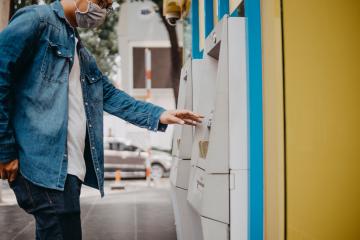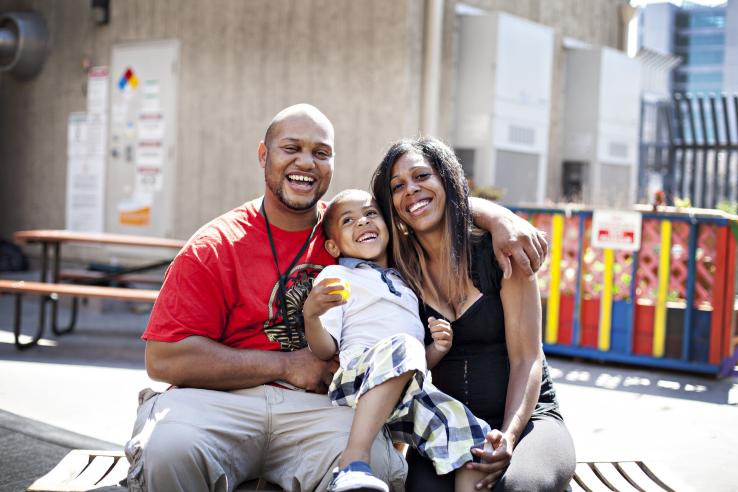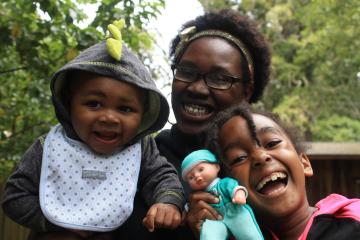
BAE Incubator partner series, part four: Hamilton Families on giving families agency

The Bay Area Evaluation (BAE) Incubator supports Bay Area service providers with implementing and evaluating cash transfer programs to assess their impact on homelessness and housing stability. In part four of our BAE Incubator partner series, Hamilton Families reflects on their experiences as an Incubator partner. Chris Constantine, Director of Data & Evaluation, explains the difference a guaranteed monthly income could make for their clients.
One of the big questions on everyone’s mind at Hamilton Families is, “How do we effectively break the cycle of homelessness?” because it truly is a cycle. Since 1985, we’ve been working with families to end their homelessness and, in that time, we’ve learned a lot. We know that to end homelessness, we need to tackle the systems that reinforce generational poverty and erect a social safety net that families can rely on to catch them in case they stumble during their journey toward housing stability.
Family homelessness tends to be the result of a sudden event that could have been prevented had a safety net been in place. For instance, a couple months ago, a mother in our Rapid Re-Housing program had her car towed, and her case manager reached out looking for options to pay the $500 fee to remove the car from the impound lot. We did not have the infrastructure to pay the fee directly, and it took us three days to secure external funding to support her. In just that short time, the fees piled up and the cost to retrieve her car doubled—a 200 percent “poverty tax.”
Family homelessness disproportionately impacts people of color and single mothers: of the 800+ families in our programs, over 80 percent of families we serve are Black and Brown, and three out of four families are led by single mothers. The average income of families entering our Rapid Re-Housing program is only $1,500 a month, and families must make difficult tradeoffs because they’re struggling to afford life’s necessities like food, clothing, transportation, and rent. A small, sudden event like a parking ticket has the potential to completely derail a family’s stability. It can prevent parents from getting to work, causing them to lose their job which means they can’t pay for bills or rent. This in turn can lead to eviction. Suddenly they’re experiencing homelessness, all because of a parking ticket. Like toppling dominoes, “small” events like these cascade, causing families to experience homelessness every single day.
Situations like these are exactly why Hamilton Families is launching an unconditional cash payment study through J-PAL North America’s BAE Incubator. This is our most ambitious intervention to end family homelessness since the creation of our Rapid Re-Housing rental subsidy program in 2006. Our randomized evaluation will help us determine whether temporary, unrestricted cash assistance to families in our Rapid Re-Housing program yields positive, long-term housing stability outcomes. We also hope to measure participants’ feelings of empowerment and agency. I often think about how that mother’s situation could have been different had she been empowered to pay that fee independent of staff intervention.
Through technical assistance, J-PAL North America staff have done a great job of keeping our project on track and thinking through all of the necessary components needed for approval from the Institutional Review Board. They have also provided us with landscape analyses of cash transfer studies in the United States and around the world. With J-PAL North America’s support, we’re taking the best practices of past and current cash transfer pilot programs while using a peer-reviewed, evidence-based, step-by-step approach to help uplift the families we are permanently housing.
I started off at Hamilton Families doing direct service work as a Case Manager for three years before moving into research. I’ve witnessed firsthand how necessary cash assistance is for families who are trying to recover their lives. The organization is now at the point where we can build capacity to implement a program like this. We can build the internal knowledge, systems, and structures to responsibly test the effects of direct cash transfers as a homelessness intervention that can benefit families experiencing homelessness in the long-term. It has truly been a full circle moment for me. Now, because of our collaboration with J-PAL North America, we have access to a credible research partner who will be able to help us reach a broader audience with our findings and our impact.
I think about our impact a lot, and the stories we hope to hear from impacted families after the end of this study.
While we have tremendous hope about the impact of this program, we expect to encounter our fair share of challenges: combating stigma around giving money to low-income folks, the considerations when providing cash assistance to some and not to others, and the operational requirements of running a multiple-year study. But breaking the cycle of homelessness has never been easy, and J-PAL North America is helping us address these challenges. Wherever we look to lift up our community, having a safe place to call home is a crucial part of the solution. We all want safe and healthy neighborhoods for ourselves and our children. Researching and testing a diverse mix of interventions across the Bay Area—including cash transfers—helps us create safer communities and work together to strengthen safety nets and break the cycle of homelessness.
Part one of this blog series explores existing evidence on cash transfers and highlights the need for further evaluation in the context of homelessness reduction and prevention in the United States. In parts two and three, Compass Family Services and Abode Services reflect on their experiences as Incubator partners.
The Homelessness and Housing Stability team at J-PAL North America will be accepting Letters of Interest for the Housing Stability Evaluation Incubator from August 1–October 17, 2022. Public housing authorities, continuums of care, nonprofit organizations, and other service providers working to reduce and prevent homelessness are encouraged to apply.
Related Content

BAE Incubator partner series, part one: Evaluating the impact of cash transfers on housing stability

BAE Incubator partner series, part two: Compass Family Services on taking evaluation to the next level


